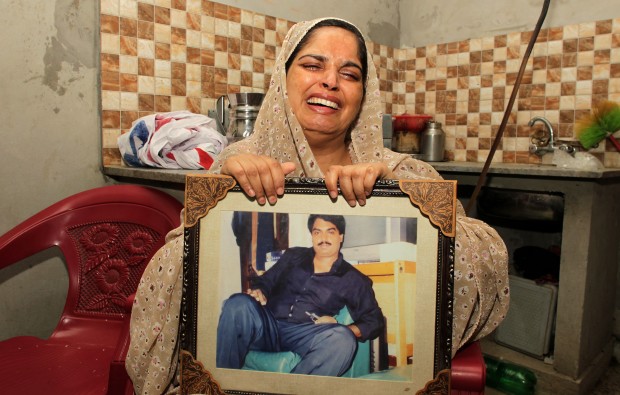Indonesia rebuffs UN, EU appeals to halt looming executions

Humaira Bibi, sister of Zulfikar Ali, convicted of drug crimes, cries in Lahore, Pakistan, Wednesday, July 27, 2016. The sister of a Pakistani convicted of drug crimes has appealed the Indonesian government to spare the life of her ailing brother who is expected to be executed by a firing squad along with 12 others in the next 48 hours. (AP Photo/K.M. Chaudary)
CILACAP, Indonesia — Indonesia quickly rebuffed appeals from the U.N. human rights chief and the European Union to abandon plans to execute 14 people for drug crimes as preparations intensified Thursday at the prison island where the death row inmates are held.
U.N. High Commissioner for Human Rights Zeid Ra’ad Al Hussein said he’s “deeply concerned” by death penalty cases that lack transparency and compliance with the right to a fair trial, including the right to an appeal. He called on the government of President Joko “Jokowi” Widodo to impose an immediate moratorium on executions.
READ: UN rights chief calls for ban on executions in Indonesia
A stream of ambulances carrying coffins arrived Thursday morning at the port town nearest to the Nusa Kambangan prison island, where the executions of the mostly foreign drug convicts will be carried out by firing squads. Officials began tightening security at the prison several days ago, with more than 1,000 police sent to Cilacap, the port town, and the island.
Indonesia has not released an official list of those to be executed but the country’s attorney-general on Wednesday said 14 people would be put to death.
Article continues after this advertisementCommunity Legal Aid Institute, which is involved in some of the death row cases, has circulated the names including four Indonesians, six Nigerians, two Zimbabweans, one Indian and one Pakistani. Previously, the attorney-general’s office said it had budgeted funds for up to 16 executions this year.
Article continues after this advertisementThe EU said the death penalty is an unacceptable denial of human dignity and called on Indonesia to “consider joining the wide community of over 140 states that have abolished the death penalty entirely or have adopted a moratorium.”
Muhammad Rum, a spokesman for Indonesia’s attorney-general, said the executions are the “implementation of our positive laws” and will not be delayed or stopped. All the cases have gone through a long legal process including appeals, he said. “They all have been given chances at all stages.”
The Indonesian government says the death penalty is necessary for drug crimes because the country is facing a drug epidemic, particularly affecting young people. But critics argue capital punishment is not an effective deterrent and some have also questioned the accuracy of the government’s drug abuse statistics.
It would be the third set of executions under Jokowi, who campaigned on promises to improve human rights. His 2-year-old administration will have executed more people than were executed in the previous decade. Fourteen were put to death last year.
Lawyers and rights groups have raised serious doubts about the legitimacy of the convictions in several drug cases, including that of Pakistani Zulfikar Ali, Indonesian Merri Utami and Nigerian Humphrey Jefferson.
From Lahore, Ali’s sister Humaira Bibi on Wednesday made an emotional appeal to the Indonesian government to spare the life of her ailing brother.
Justice Project Pakistan, a group that provides free legal representation, said that Pakistani diplomats were trying to save Ali but intervention by Pakistan’s president or prime minister is now required. It said that Indonesian police used violent duress to obtain a confession from Ali, who was arrested in November 2004.
India’s External Affairs Minister Sushma Swaraj said on Twitter that her government was making “last minute efforts” to save Gurdip Singh.
The government of Jokowi’s predecessor did not carry out executions between 2009 and 2012, but resumed them in 2013.
Worldwide, China is believed to the country with the highest number of executions but it does not release figures. Amnesty International estimates several thousand people are executed in China each year. Of the more than 1,600 publicly announced executions last year, Amnesty says nearly 90 percent of them were in three countries: Saudi Arabia, Pakistan and Iran.